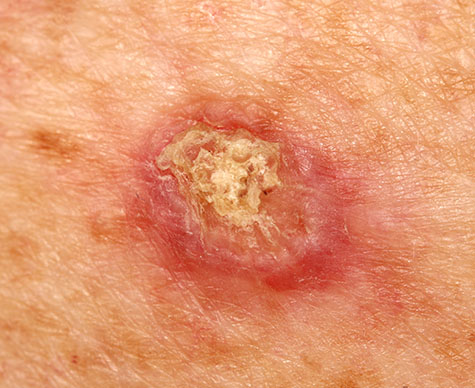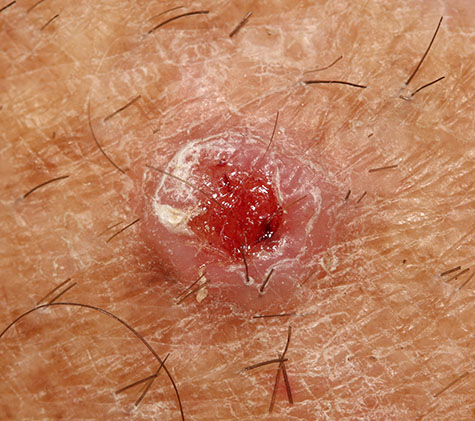What Causes Squamous Cell Carcinoma?
Squamous cell carcinoma is primarily caused by damage to your skin cells by chronic ultraviolet (UV) light. This can occur over time due to either excessive exposure to natural sunlight or tanning bed use.
Who Gets Squamous Cell Carcinoma?

You are more likely to develop squamous cell carcinoma if you have the following risk factors:
- UV-damaged skin due to sun exposure or indoor tanning
- Fair skin, blond or red hair, and/or light-colored eyes
- History of sunburns, especially if they caused blisters
- History of actinic keratoses
- History of HPV infection
- Living in a sunny climate or high altitude
- A previous skin cancer diagnosis
- Weakened immune system due to a medical condition or certain medications
How Can I Prevent Squamous Cell Carcinoma?
Avoiding excess sun or UV light exposure is the most important way to avoid squamous cell carcinoma. To protect your skin, follow these steps:
- Routinely apply sunscreen with SPF 30 or higher
- Seek shade whenever possible
- Wear sun-protective clothing, including wide-brimmed hats and sunglasses
- Avoid tanning beds
- Perform regular skin self-exams
Why Treat Squamous Cell Carcinoma?
Squamous cell carcinoma can be easily treated by a dermatologist, especially when it is detected early. If it is detected or treated too late, it can be very dangerous to your overall health as it can spread to other parts of your body. If you notice signs of squamous cell carcinoma, you should schedule an appointment as soon as possible for your best possible treatment options and results.
Signs of squamous cell carcinoma include:
- Rough, scaly persistent painful patch or bump
- Open sores that do not heal
- Firm dome-shaped or horn-shaped growths
- Sores that develop within scars
- Wart-like growths

How Can I Treat Squamous Cell Carcinoma?

Your dermatologist will first diagnose squamous cell carcinoma typically after a careful physical exam, followed by a skin biopsy to confirm the diagnosis. After appropriate diagnosis, the squamous cell carcinoma can be treated by using one of the following methods, depending on the type and stage of the squamous cell carcinoma:
- Excision
- Mohs surgery
- Curettage
- Radiation therapy
Schedule an Appointment
If you have a squamous cell carcinoma or are concerned that you may be developing one, it is important to seek treatment from a board-certified dermatologist as soon as possible. Squamous cell carcinoma is often easily treated but can spread if it is not addressed early, resulting in further health complications.
To schedule an appointment at Arlington Dermatology, please call our office or request an appointment online.


